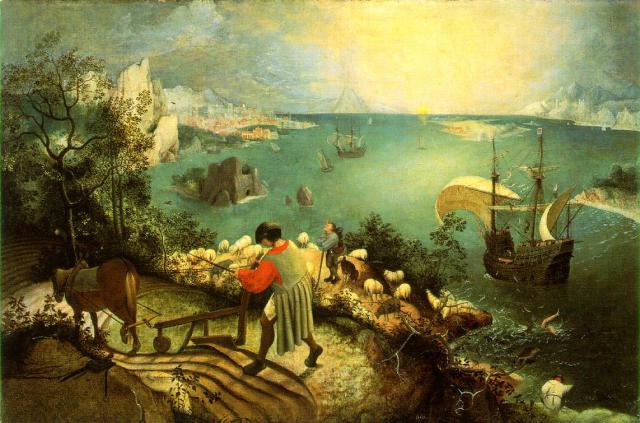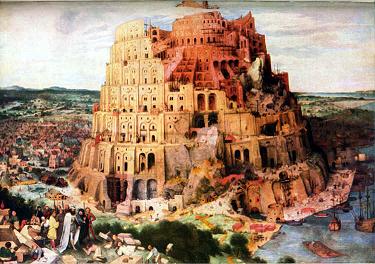Serendip is an independent site partnering with faculty at multiple colleges and universities around the world. Happy exploring!
Week Seven (Tues, 3/1): "Full of Hope and Possibility"
The Tower of Babel by Pieter Bruegel the Elder (1563)
The Tower of Babel story...and a contemporary counter-story
I. coursekeeping
this week we conclude our discussion of Darwin's Dangerous Idea
on Friday, Mar. 4, your second webpaper is/was due, on some aspect of the story of evolution beyond the context of biology (remember to make a
portfolio entry, and to tag it for this course)...
but a general extension is available to all,
til right after break: 5 p.m. on Monday, March @ 15
by this weekend, you should have also made 6 postings;
you might 'track' yourself (katlittrell as ex) and see how
you're doing here; if you still owe us, pay up now!
on Sunday evening, when you come back from break,
also please post a "mid-semester evaluation":
your reflections on what's working, and what needs working on,
both for you as an individual and for us as a group (on-line, in class).
after break, we will make the shift we've all been waiting for (!):
from "the story of evolution" to "the evolution of stories."
I'll be picking up the Tuesday lectures, and we'll begin by reading
Richard Powers' 2009 novel, Generosity; finish the first 1/2 of it by
the time we return; after that, we'll do Albert Camus's 1947 novel,
The Plague; and then finish with a contemporary narrative form,
that of film; after weeks of fussing, I've finally settled on
Spike Jonze's 2003 movie, Adaptation.
questions about any of these details?
II. exploring the forum
Starting with some questions of clarification:
ashley: This idea of selfish genes continues to puzzle me....I don't see how they can be categorized as "selfish" when they are not capable of acting with such intentions in mind....Genes are being personified and being qualified with an ability to think and scheme. Something that is not rightly possible....what it all comes down to is a matter of random pairing and luck of the draw.
alexandrakg: I still do not fully understand memes. I am not sure if culture can be measured or divided into units....Oversimplifying does not help us discover what culture is, in fact, it may prevent us from learning more.
ems8140: While it is understood that genes code for proteins, it has not been determined for what memes code....these small units of culture...help to code for the overarching ideas, beliefs, values, etc. of a culture....repetition among many people leads to the development of a broader cultural value
ewashburn: For all I think memes are problematic ... it's helpful to encapsulate certain cultural traits as "building blocks" in order to follow their development across history. I'm even pretty intrigued by the idea of boiling an element of culture down to its most basic elements.... Still, I'm frustrated by their inherent oversimplification. Cultural landmarks are so complex, so nuanced.... until their oversimplifying can be checked, the organizational potential of memes cannot fully be realized.
SarahS: I too have a problem with Dennett's analogy of memes to genes. Within our DNA there is a set limit on the number of genes we posses, but everything within a biological system derives from this set of genes. I feel that for memes to be the building blocks of culture there would almost need to be an infinite number of memes ...making sorting almost useless. Dennett takes the analogy too far.
phyllobates: I have spent the last two weeks trying to convince myself that an algorithm with a random step produces a different outcome than pure randomness does....after much thought I am seeking further clarification....Dennett, I suppose I do see your point evolution is not a random process, it is “algorithmic” with the random step of genetic inheritance.
Then a very strong debate developed about the attractiveness and usefulness
of the concept of the "library of babel," as a story for what we are up to:
ib4walrus: The Library of Babel ultimately means the death of creativity and originality as we know it. With all potential books, papers, etc. all "pre-existing" on one of the seemingly infinite shelves of the library already, nothing "new" can be thought of/written....This idea that everything already exists is so... crippling ....I'd still like to believe in the ability to create something that is truly unique.... I don't find Dennett's deterministic view too appealing.
vlopez: Dennett's metaphor of the Library of Babel... does not make any sense to me....It goes against evolution because in this library everything is already there; therefore, there is no room for randomness, which is part of the evolutionary process. Everything has already been created; therefore, there are no modifications....All we do is check out a book.... I'd like to think we have the ability to be more dexterous than simply being able to flip a coin to choose which way to go and checking out a book.
tangerines: my main issue with the idea of a library is that ... it limits the randomness of the universe and of our options. Using the library concept, where we begin limits where we will end up – that is, we will most likely be constricted to the nearby ideas cataloged around us, because to reach an idea across the library would not only be an extremely long journey, it would be difficult for us to even conceive of this idea because it is so far removed from the ideas to which we are accustomed.... I do want to believe that it's possible for me to read whatever book strikes my fancy – not just the ones grouped nearby.
but then comes a turn in the conversation:
bee27: If everything is in this library, there are infinite possibilities... waiting on a high shelf ... for us to discover.... Instead of being fixed and hopeless, devoid of human intelligence or creativity, I now see this library as full of hope and possibility... this fosters creativity, and gives me something to aspire to- Like there are an infinite number of ways for me to find my voice, or discover my passion, or show the world what I'm capable of coming up with.
elly: I really like this optimistic approach to the idea of a "library full of hope and possibility." The image of ideas waiting to be discovered and then assigned to one human being or another is very positive, as it suggests that we do still have a sense of agency ... without someone to act on an idea, or realize it and believe it... then what good is it?... it is very difficult to become comfortable with this idea of chance being responsible, at some deeper level, for everything that is happening in our lives, in our evolution and perhaps even in our minds. This is why I like this positive approach, because it says that we are still important in the using the ideas...
mgz24: we'll never know. Why not just drop the conversation all together. For those who want to think they have control then that's what they'll believe and those who like things determined will believe that....asking the question just brings about more unrest
KT: why should we think about our agency? Because the answer is important! If we don't have agency, we’re not responsible for our behavior, actions or goals. Agency gives us the key tool we need to change, improve and make a difference. Without this, we are just dogs barking up a tree.
Or a young man, falling from the sky?

Breugel's Landscape with the Fall of Icarus (1558)
From Dennett, p. 518: "one of my favorite poems.
Musée des Beaux Arts
About suffering they were never wrong,
The Old Masters: how well they understood
Its human position, how it takes place
While someone else is ... just walking dully along....
In Breughel's Icarus, for instance: how everything turns away
Quite leisurely from the disaster: the ploughman may
Have heard the splash, the forsaken cry,
But for him it was not an important failure; the sun shone
As it had to on the white legs disappearing into the green
Water, and the expensive delicate ship that must have seen
Something amazing, a boy falling out the sky,
Had somewhere to get to and sailed calmly on.
That is our world [Dennett continues] and the suffering in it matters, if anything does."
So, Paul...help us out here! Can this "dangerous"
story of yours make sense of suffering....?



